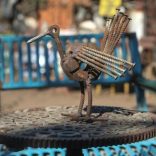Roberto Dove is the new director-general of Mozambique's Institute of Cultural and Creative ...
Nyau Gule Wamkulu Festival kicks off in Tsangano, Tete

micultur.gov.mz (File photo)
Nine Nyau Gule Wamkulu dance groups, coming from almost all districts of the province of Tete, will participate from today until Sunday in the 8th edition of the Provincial Culture and Nyau Gule Wamkulu Festival. The event will take place at the Biri-Biri Cultural Centre, in the N’tengo Wambalame Administrative Post, Tsangano district.
The Festival is organised by the Government of Tete, through the Provincial Directorate of Culture and Tourism.
The groups that already had the instruments tuned, began the concentration for the registration, accommodation and storage of all the material of the artists as early as Wednesday.
There were rehearsals and improvement of last minute details for the performances, as well as lectures on the historical and cultural importance of the Nyau dance.
The provincial director of Culture and Tourism in Tete, Fernando Manjate, told Noticias on Wednesday that this festival is part of the program of the annual commemoration of the Nyau Gule Wamkulu as Intangible Cultural Heritage of Humanity. Manjate added that a group from neighbouring Malawi will also participate .
According to the program, before the start of this party, participants and guests will visit an exhibition of works of art and crafts produced in Tete, highlighting the districts along the Angónia / Maravia plateau.
“We want to take the opportunity to appeal to the practitioners of this dance to take initiatives of nature conservation, especially of forest resources, because that is where it leaves the main raw material used for the manufacture of instruments,” said Manjate.
He added that through this cultural expression artists can support the Government in the dissemination of messages on combating ‘queimadas’ [bush fires], rational and sustainable use of forests to avoid environmental imbalances in communities, mainly in rural areas.
The 8th Provincial Festival of Nyau Gule Wamkulu, which will take place simultaneously with the celebrations of the National Day of Culture, which is marked on Sunday, will also showcase other cultural expressions practised in Tete as well as a gastronomy fair, which will precede the closing of the festival.
By Bernardo Carlos
Gule Wamkulu – Malawi, Mozambique and Zambia
Inscribed in 2008 (3.COM) on the Representative List of the Intangible Cultural Heritage of Humanity (originally proclaimed in 2005)
Gule Wamkulu was a secret cult, involving a ritual dance practiced among the Chewa in Malawi, Zambia, and Mozambique. It was performed by members of the Nyau brotherhood, a secret society of initiated men.
Within the Chewa’s traditional matrilineal society, where married men played a rather marginal role, the Nyau offered a means to establish a counterweight and solidarity among men of various villages.
Nyau members still are responsible for the initiation of young men into adulthood, and for the performance of the Gule Wamkulu at the end of the initiation procedure, celebrating the young men’s integration into adult society.
Gule Wamkulu is performed in the season following the July harvest, but it can also be seen at weddings, funerals, and the installation or the death of a chief. On these occasions, the Nyau dancers wear costumes and masks made of wood and straw, representing a great variety of characters, such as wild animals, spirits of the dead, slave traders as well as more recent figures such as the honda or the helicopter. Each of these figures plays a particular, often evil, character expressing a form of misbehaviour, teaching the audience moral and social values. These figures perform dances with extraordinary energy, entertaining and scaring the audience as representatives of the world of the spirits and the dead.
Gule Wamkulu dates back to the great Chewa Empire of the seventeenth century.
Despite the efforts of Christian missionaries to ban this practice, it managed to survive under British colonial rule by adopting some aspects of Christianity. As a consequence, Chewa men tend to be members of a Christian church as well as a Nyau society.
However, Gule Wamkulu performances are gradually losing their original function and meaning by being reduced to entertainment for tourists and for political purpose.












Leave a Reply
Be the First to Comment!
You must be logged in to post a comment.
You must be logged in to post a comment.